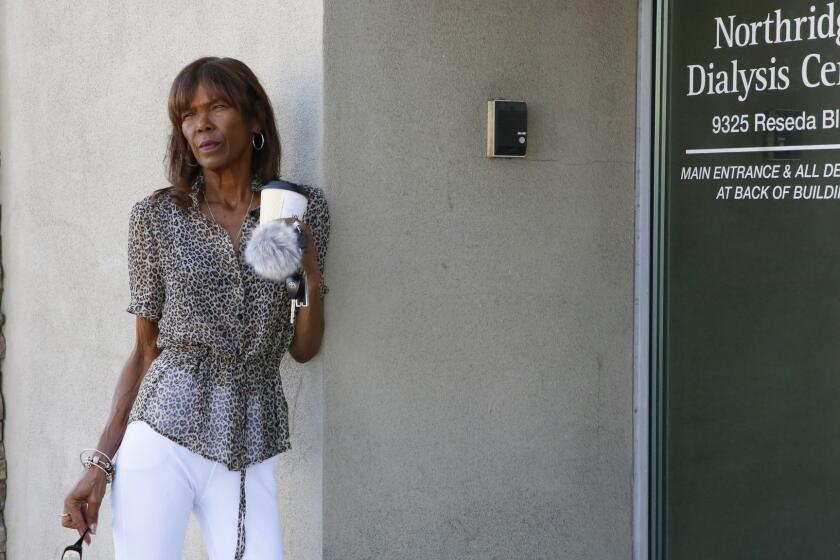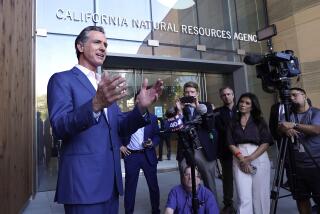Column: Dialysis firms try to strong-arm Gov. Newsom into vetoing a bill capping their profits

- Share via
The businesses that lobbied the state Legislature over measures that would help or harm them know their work isn’t done just because the lawmakers have cast their votes and gone home for the year. There’s still Gov. Gavin Newsom’s signature or veto to be won.
Among the players stepping forward is the American Kidney Fund, which paints itself as a charity devoted impartially to helping patients facing the torment and expense of dialysis. The fund’s target is a bill passed Sept. 10 that would cap the profits enjoyed by corporate dialysis providers and impose disclosure requirements on third parties, like the fund, that help dialysis patients afford their insurance.
The fund claims that the measure, Assembly Bill 290, would force it to break federal law. Therefore, it says, if Newsom signs the bill, the fund will abandon the patients it has been helping in California.
I’m committed to protecting patients but I’m not interested in protecting dialysis companies from scamming the system for their own benefit.
— Assemblyman Jim Wood, D-Healdsburg
“We are informing all of our grant recipients in California and the social workers at the clinics, hospitals and nursing homes where they are treated that if Governor Newsom signs AB 290, it will force us to stop providing charitable premium assistance in California on the day it becomes law, January 1, 2020.”
In other words, the fund is making hostages of the 3,700 “struggling patients” in California who it says “depend on our assistance.” Now, that’s pressure.
The worst maladies of the American healthcare system are related to corporate profits: The competition among insurance companies to avoid the sickest customers and extract the most money from the rest, and the rise of for-profit healthcare providers.
A couple of facts make this argument less than persuasive, however. One is that AB 290 would do nothing to force the American Kidney Fund to violate federal law or regulations. That’s plain from the bill’s text, which says that the provisions governing its activities won’t go into effect until the inspector general of the U.S. Department of Health and Human Services confirms that they wouldn’t force the fund to breach federal rules and regulations.
The American Kidney Fund says that’s not good enough. “Knowing that AB 290 is unlawful and discriminatory toward the people we help,” the fund told me by email, asking the inspector general to rule on a program that complies with AB 290 “would not be a good-faith request on our part, and we cannot do that.”
The second point is that the American Kidney Fund does not really resemble an independent charity. As we’ve reported, the fund looks like a front for the two dominant private dialysis providers in the U.S., Denver-based DaVita and German-owned Fresenius, which have provided about 80% of its funding in recent years. The companies have given the fund a subsidy of more than $200 million a year dating back to 2015; last year, their combined contribution was $247 million, according to the fund’s annual report.
That suggests that the American Kidney Fund’s concern may be less for the 3,700 California patients it helps than for the financial fortunes of the two companies that fill its larder.
The firms themselves have signaled their opposition to AB 290 via Dialysis is Life Support, which has been campaigning against the bill. The organization received more than $446,000 in August from the lobbying group Patients and Caregivers to Protect Dialysis Patients, which last year received $67 million in contributions from DaVita and $34 million from Fresenius, more than 90% of its total income in 2018.
Things were looking bad for the Affordable Care Act in 2016 and 2017.
“I’m committed to protecting patients,” Assemblyman Jim Wood, D-Healdsburg, said in January when he introduced AB 290, “but I’m not interested in protecting dialysis companies from scamming the system for their own benefit.” Wood’s office says Newsom hasn’t signaled how he feels about the bill. He could sign or veto it at any moment.
The fund says it’s fearful that the disclosure requirements in AB 290 would breach an advisory opinion issued by the HHS inspector general in 1997, which found that there was enough separation between the fund and its big donors to comply with rules barring payments to patients conditioned on their choosing particular healthcare providers.
The inspector general “approved our program in large part because it is a blind donation system,” the fund says. The disclosures required by AB 290 would allow patients to figure out that providers such as DaVita and Fresenius are contributors to their premium assistance. “When ... patients know this information, they may be improperly influenced to use a particular provider — a violation of federal fraud and abuse laws.”
The Legislative Counsel Bureau, which provides legal advice to Sacramento lawmakers, says it’s possible that patients might figure out who’s paying for their insurance, but it’s probably not a big deal. The bureau concluded that the connection between the disclosure requirement and the patient’s potential knowledge is sufficiently “attenuated” that the inspector general probably wouldn’t find the requirements of AB 290 to be a problem.
It might help to understand what’s going on here by recapping the history of the dialysis industry.
As we have learned from bitter experience over the years, in California’s ballot initiative process, money talks.
To begin with, this is a fabulously profitable business. The two companies operate more than 4,000 outpatient clinics where patients with kidney failure undergo dialysis, which filters their blood of impurities that healthy kidneys would handle, at least three times a week until and unless they can secure a kidney transplant. In 2018, DaVita recorded pre-tax operating profit of $1.5 billion on dialysis revenue of $10.7 billion and Fresenius pulled in $1.9 billion on North American dialysis revenue of $10.9 billion.
Traditionally, the expense of this procedure — roughly $90,000 a year — made dialysis patients uninsurable. Congress crafted a solution in 1973 by making those patients eligible to enroll in Medicare, regardless of age. The act effectively made end-stage renal disease the only condition subject to a single-payer program in the U.S.
The Affordable Care Act changed the marketplace by forbidding private insurers to reject customers because of their dialysis needs (or for any other reason). DaVita and Fresenius have experienced enviable growth since the ACA’s enactment in 2010. Since private insurance reimbursements for dialysis were so much higher than Medicare’s, revenues and profits at both companies rose steadily — in 2009, Davita reported operating income for dialysis of $940 million on dialysis revenue of only $5.8 billion, and Fresenius reported $1.25 billion in operating profit on revenue of $7.6 billion in North America.
Both companies have been candid about the importance of the private insurance payments for their bottom lines. Medicare pays about $260 per treatment, but reimbursements from private insurers can be up to 10 times as much.
President Trump was showered in praise Wednesday when he unveiled an initiative to fix the country’s wretched and ridiculously expensive system for dealing with kidney disease.
DaVita reported last year that while government programs such as Medicare and Medicaid accounted for 89% of their patients, those programs’ reimbursements accounted for only 69% of the firm’s revenue. Commercial insurers, who covered only about 10% of the patients, provided some 30% of Davita’s income.
It may not be surprising that DaVita and Fresenius have been accused of steering patients away from Medicare and into private insurance coverage, even if the latter is not always suitable for the patients. Aetna, for instance, has sued DaVita in Pennsylvania state court, citing accusations that the dialysis firm had been diverting patients into commercial insurance plans to capture their larger reimbursements. DaVita denies the accusation.
In 2016, Medicare officials started collecting information from insurers and others about the alleged steering. It said its concern was that the practice could “raise overall health system costs, … result in higher out-of-pocket costs for enrollees, and have a negative impact on the individual market single risk pool.”
In December 2017, Medicare officials issued a rule requiring that dialysis firms disclose to patients that they contributed to the charity paying their premiums and giving insurers the right to turn away patients receiving the charitable help. But the rule was blocked by a federal judge in Texas on a motion brought by DaVita, Fresenius and an advocacy group called Dialysis Patient Citizens, which was founded by DaVita. The rule-making has stagnated under Trump, whose secretary of Health and Human Services oversees Medicare.
Since January 2017 there has been no action on the rule, and according to DaVita’s latest annual report none is expected for 2019. Meanwhile, federal prosecutors in Massachusetts have opened an investigation into the relationship between the dialysis firms and the Kidney Fund. The status of the investigation is unclear.
The ability of the dialysis firms to game the ACA has been drawing attention in California for several years, in part because of a battle waged by the Service Employees International Union-United Healthcare Workers West, which is hoping to unionize clinic employees.
A bill similar to AB 290 passed the Legislature last year, but was vetoed by former Gov. Jerry Brown. The SEIU put up a ballot initiative in last November’s election that would have capped the firms’ profits at 15% over their direct spending on health services. The initiative failed in a 60-40 vote following a spectacularly expensive initiative campaign in which DaVita and Fresenius spent a combined $100 million to defeat it, swamping the SEIU’s measly $18 million.
AB 290’s restrictions are aimed at “financially interested” entities in the dialysis market. That would include the American Kidney Fund as a third-party provider of financial assistance, and dialysis providers with a financial relationship with charities such as the fund. The charity would have to disclose to insurers the names of patients for whom it’s providing help.
The bill addresses American Kidney Fund’s policy of ending financial aid to patients after they get a transplant by prohibiting charities from conditioning their financial aid on transplants or any other surgery. it would outlaw the steering of patients to any particular type of insurance, such as private plans. Patients currently receiving help from the American Kidney Fund would be grandfathered under the law, so they could still receive assistance despite the new rules.
The private dialysis firms are responsible for creating the problem that AB 290 seeks to address. The firms’ pursuit of private insurance reimbursement, and their funding of a charity that provides money for patients to choose private insurers over Medicare, drove dialysis costs ever higher and even forced some big insurers out of the ACA coverage market entirely. Now, through the American Kidney Fund, they’re wringing their hands over the effect that a much-needed regulation will have on their own patients.
As Wood said in his letter to Newsom asking for the governor’s signature, his goal was to “prevent blatant market manipulation that leads to unnecessary costs in the healthcare system, harms patients and damages our insurance market.” He’s right: There’s no better example of how the pursuit of pure profit infects our healthcare system than this one.
More to Read
Inside the business of entertainment
The Wide Shot brings you news, analysis and insights on everything from streaming wars to production — and what it all means for the future.
You may occasionally receive promotional content from the Los Angeles Times.












